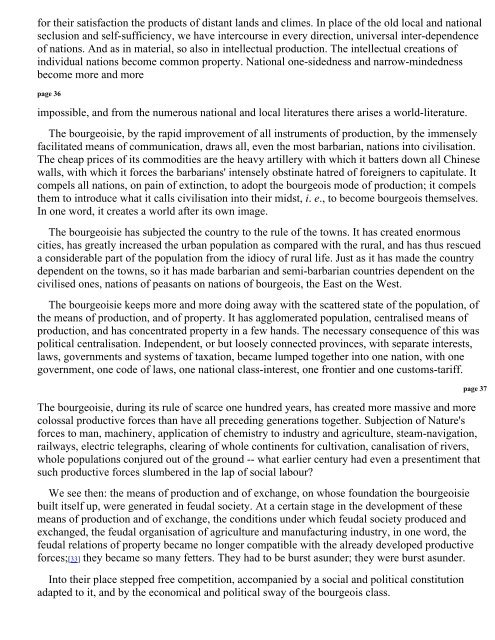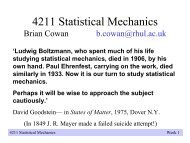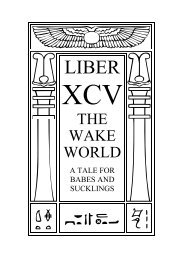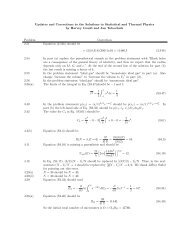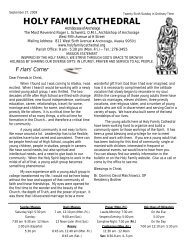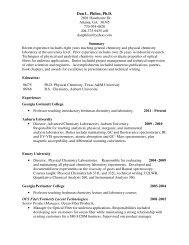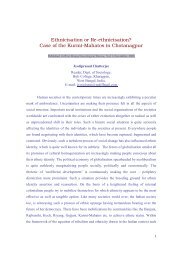Manifesto of the Communist Party - WebRing
Manifesto of the Communist Party - WebRing
Manifesto of the Communist Party - WebRing
You also want an ePaper? Increase the reach of your titles
YUMPU automatically turns print PDFs into web optimized ePapers that Google loves.
for <strong>the</strong>ir satisfaction <strong>the</strong> products <strong>of</strong> distant lands and climes. In place <strong>of</strong> <strong>the</strong> old local and national<br />
seclusion and self-sufficiency, we have intercourse in every direction, universal inter-dependence<br />
<strong>of</strong> nations. And as in material, so also in intellectual production. The intellectual creations <strong>of</strong><br />
individual nations become common property. National one-sidedness and narrow-mindedness<br />
become more and more<br />
page 36<br />
impossible, and from <strong>the</strong> numerous national and local literatures <strong>the</strong>re arises a world-literature.<br />
The bourgeoisie, by <strong>the</strong> rapid improvement <strong>of</strong> all instruments <strong>of</strong> production, by <strong>the</strong> immensely<br />
facilitated means <strong>of</strong> communication, draws all, even <strong>the</strong> most barbarian, nations into civilisation.<br />
The cheap prices <strong>of</strong> its commodities are <strong>the</strong> heavy artillery with which it batters down all Chinese<br />
walls, with which it forces <strong>the</strong> barbarians' intensely obstinate hatred <strong>of</strong> foreigners to capitulate. It<br />
compels all nations, on pain <strong>of</strong> extinction, to adopt <strong>the</strong> bourgeois mode <strong>of</strong> production; it compels<br />
<strong>the</strong>m to introduce what it calls civilisation into <strong>the</strong>ir midst, i. e., to become bourgeois <strong>the</strong>mselves.<br />
In one word, it creates a world after its own image.<br />
The bourgeoisie has subjected <strong>the</strong> country to <strong>the</strong> rule <strong>of</strong> <strong>the</strong> towns. It has created enormous<br />
cities, has greatly increased <strong>the</strong> urban population as compared with <strong>the</strong> rural, and has thus rescued<br />
a considerable part <strong>of</strong> <strong>the</strong> population from <strong>the</strong> idiocy <strong>of</strong> rural life. Just as it has made <strong>the</strong> country<br />
dependent on <strong>the</strong> towns, so it has made barbarian and semi-barbarian countries dependent on <strong>the</strong><br />
civilised ones, nations <strong>of</strong> peasants on nations <strong>of</strong> bourgeois, <strong>the</strong> East on <strong>the</strong> West.<br />
The bourgeoisie keeps more and more doing away with <strong>the</strong> scattered state <strong>of</strong> <strong>the</strong> population, <strong>of</strong><br />
<strong>the</strong> means <strong>of</strong> production, and <strong>of</strong> property. It has agglomerated population, centralised means <strong>of</strong><br />
production, and has concentrated property in a few hands. The necessary consequence <strong>of</strong> this was<br />
political centralisation. Independent, or but loosely connected provinces, with separate interests,<br />
laws, governments and systems <strong>of</strong> taxation, became lumped toge<strong>the</strong>r into one nation, with one<br />
government, one code <strong>of</strong> laws, one national class-interest, one frontier and one customs-tariff.<br />
The bourgeoisie, during its rule <strong>of</strong> scarce one hundred years, has created more massive and more<br />
colossal productive forces than have all preceding generations toge<strong>the</strong>r. Subjection <strong>of</strong> Nature's<br />
forces to man, machinery, application <strong>of</strong> chemistry to industry and agriculture, steam-navigation,<br />
railways, electric telegraphs, clearing <strong>of</strong> whole continents for cultivation, canalisation <strong>of</strong> rivers,<br />
whole populations conjured out <strong>of</strong> <strong>the</strong> ground -- what earlier century had even a presentiment that<br />
such productive forces slumbered in <strong>the</strong> lap <strong>of</strong> social labour?<br />
We see <strong>the</strong>n: <strong>the</strong> means <strong>of</strong> production and <strong>of</strong> exchange, on whose foundation <strong>the</strong> bourgeoisie<br />
built itself up, were generated in feudal society. At a certain stage in <strong>the</strong> development <strong>of</strong> <strong>the</strong>se<br />
means <strong>of</strong> production and <strong>of</strong> exchange, <strong>the</strong> conditions under which feudal society produced and<br />
exchanged, <strong>the</strong> feudal organisation <strong>of</strong> agriculture and manufacturing industry, in one word, <strong>the</strong><br />
feudal relations <strong>of</strong> property became no longer compatible with <strong>the</strong> already developed productive<br />
forces;[33] <strong>the</strong>y became so many fetters. They had to be burst asunder; <strong>the</strong>y were burst asunder.<br />
Into <strong>the</strong>ir place stepped free competition, accompanied by a social and political constitution<br />
adapted to it, and by <strong>the</strong> economical and political sway <strong>of</strong> <strong>the</strong> bourgeois class.<br />
page 37


